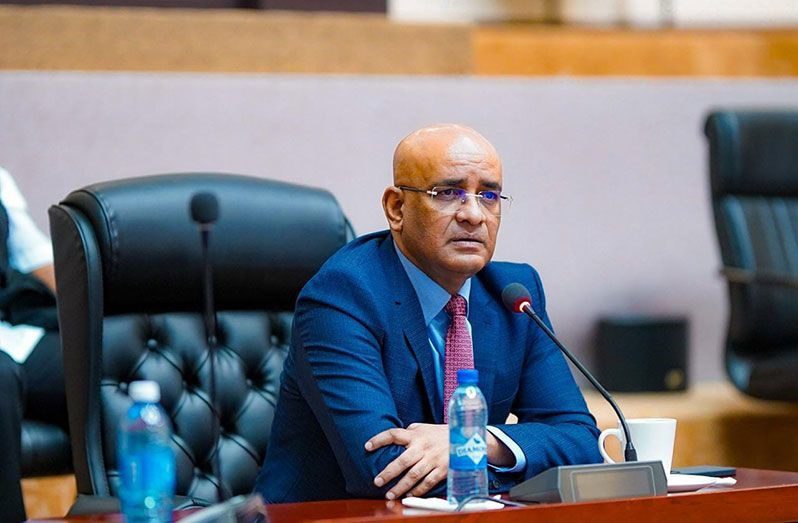–Dr Jagdeo highlights its impracticality, says billions invested by PPP/C gov’t
PEOPLE’S Progressive Party (PPP) General Secretary Dr Bharrat Jagdeo has dismantled Leader of the Alliance For Change (AFC), Nigel Hughes’ abstract theory on how the oil revenue should be distributed .
Despite Hughes’ party along with the A Partnership for National Unity (APNU) being in office from 2015-2020 and failing to deliver most of its manifesto pledges, the opposition has once again begun its campaign of rolling out promises.
However, Dr. Jagdeo used his weekly news conference on Thursday at Freedom House to highlight the impracticality of Hughes’ recent post on Facebook, which called for direct cash transfers to every citizen.
Firstly, the PPP General Secretary, who also serves as Guyana’s Vice President, said that oil revenue only funded 30 per cent of this year’s budget, which was $1.1 trillion.
As he continued to school Hughes, Dr Jagdeo highlighted that the budget for the health sector this year is $129 billion and the one for education is $135 billion.
As it relates to what is in the budget when it comes to the increase in wages and salaries from 2020, he said that it has now gone up by $90 billion.
According to Hughes, Guyana collects annual revenue of G$568.03 billion and the government should immediately table legislation which mandates that every adult citizen be given a direct cash transfer.
He then said that the payment shall not exceed 10.5 per cent of the annual transfer to the Natural Resource Fund (NRF).
However, with this, Guyanese would gain significantly less as opposed to what the government is spending on health, education and wages and salaries, among other things, according to Dr Jagdeo.
To give more perspective on the impracticality of this proposal, he explained: “So, if you take $300 billion today and you take, say, 10 per cent of it, which is $30 billion, and you divide [that] by 850,000 people, you will probably get about G$35,000 per year. That’s what he wants…And next year, if we double, you’ll get $70,000 Guyana dollars. And he believes that that is the great proposal.

“So, what about the years that we don’t have any money? Or what [about] oil prices? There’s a prediction now that oil prices could even fall because of oversupply. What if it comes down in the future? What are people going to be left with?” Dr Jagdeo questioned, while emphasising how unfeasible Hughes’ plan really is.
Also, the PPP General Secretary criticised the opposition for having a disorganised posture on the oil and gas sector and he said that the current government is now limited by the lopsided Stabroek Block contract that the former administration signed.
The AFC’s disorganised posture on the oil and gas sector was further cemented by the Vice President, who reminded the public that while the AFC Leader is advocating for immediate direct cash transfers, an article dated April 18, 2017, discloses that the AFC’s Raphael Trotman, the Natural Resources Minister at the time, rejected the idea of using oil revenue for cash payments.
Last week, the Government of Guyana withdrew a further US$ 1.5 million from the NRF following parliamentary approval.
According to a press release from the Ministry of Finance, those funds constitute the third transfer for 2024 to the Consolidated Fund.
The ministry noted that Pursuant to the NRF Act 2021, as amended by the Fiscal Enactments (Amendment) Act 2024, parliamentary approval was granted for US$1,586,150,331 (equivalent to G$329,885,563,088) to be withdrawn from the NRF in 2024.
OPPOSITION INCONSISTENT
The PNC/APNU/AFC has constantly made the call to increase spending, using oil revenues, on recurring expenditures — that is wages/salaries, pensions, etc. — and this would increase the country’s recurrent expenditure without a sustainable financial strategy.
Also, the parliamentary opposition has not articulated a plan for what would happen if oil revenues fall or how these high recurrent expenditures would be financed in such a scenario.
This lack of foresight and planning is reminiscent of the economic mismanagement seen from 1964 to 1992 under the PNCR, which led Guyana to the brink of economic ruin.


.jpg)











